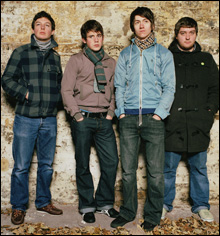|

SONGWRITING:Get a good rhythm, make sure the syllables scan, and then “pay attention to every aspect.”
|
The Arctic Monkeys’ Alex Turner — 20-year-old genius frontman of the UK’s hottest band — sounds the way you’d expect him to sound on a cross-continental phoner on a late Monday afternoon, four days into the current leg of a tour (coming to Avalon for a sold-out show this Saturday) that started around Christmas — “a week off here, a few days there.” He’s friendly enough talking from Portland, Oregon, smart as you’d expect, drawling quietly in that soft South Yorkshire accent that everyone by now knows from Whatever People Say I Am, That’s What I’m Not (Domino), charmingly swallowing his consonants, just as on the record, drifting off, yawning when he answers a question he’s been asked a thousand times before (“Indeed . . . absolutely”). But also giving off flashes of that wit — that presence of mind that allowed him to announce matter-of-factly during the band’s debut US television appearance on Saturday Night Live, mid song, pointing, as if it were part of the lyric, “That man just yawned.” Ah, live TV!
So he yawns, mumbles into inaudibility, perks up. He’s been “a bit ill” today, didn’t have much of a chance to get into a songwriting groove, but part of the problem is “there’s no fuckin’ acoustic on this tour.” Some of us forget the sunblock when we pack, others the acoustic guitar. And he curses in an offhand, indifferent way. How old is he, exactly? What’s the date?
“Six of January.”
“January 6 of what?”
“No, sorry, fuckin’ ’ell, 1986, of course you need to know that.”
And I’m reminded of what an ex-girlfriend of his told the press: “He was a lovely lad.”
The Monkeys’ fractured mix of styles has been appealing from the start. Even given the headlong oomph of the hit “I Bet You Look Good on the Dancefloor,” there’s no monolithic single sound but a slew of influences, changing from song to song, from verse to chorus, whatever the tune seems to demand, some big-beat Gang of Four, some Clash “London Calling” chords, a touch of ska, all reinforced by their flair for melody.
But the binding agent — the roux for this particular gumbo — is Turner’s lyrics, and “the way a line falls,” as Dylan once said of his own work. Love songs, yes, but no vague metaphors — scenes and characters, story songs with folk-lyric narratives and street-level detail, delivered with rock-and-roll kick. In Turner’s singing, the lyrics cross bar lines, verse, and chorus like one of his characters sauntering across the street or running away from the police: “Last night these two bouncers/And one of ’ems alright/The other one’s a scary ’un/His way or no way, totalitarian.” Or the observation of a hooker with her pimp (“Cause he’s a scumbag, don’t you know”), and her john (“Look here comes a Ford Mondeo/Isn’t he inconspicuous”), and she all glad to see him “because she must be fucking freezing/Scantily clad beneath the clear night sky.”
The romantic centerpiece is “Mardy Bum,” the singer facing his girlfriend’s incomprehensible wrath — an argument about nothing (“Oh there’s a very pleasant side to you/A side I much prefer”). The song shifts moods and rhythms — jaunty, tense, sweet. The singer tries to appeal to that side, recalls “cuddles in the kitchen,” builds to a climax of frustration, the rhythm ratcheting up along with him: “You say that I don’t care/Well of course I do, yeah I clearly do!”
And as proof, he plays a gorgeous, succinct little guitar solo — because, as the saying goes, he’s beyond words. At the band’s Paradise show back in March, the girls were singing along from the first line, and as he played his solo, Turner faced the back wall, a private moment.
And what’s “Mardy Bum”?
“It’s a colloquial expression for someone who’s miserable for no reason.”
And how does he come up with this stuff?
“I’ll think about something and I’ll be writing, penning something down and I’ll keep building on that. The best stuff comes when I’ve got a melody and a rhythm so I know how many syllables each line is going to have and then build it up from there, and make it a whole thing, and try and pay attention to every aspect.”
The street-prostitute scene of “When the Sun Goes Down” came from the Neepsend neighborhood of Sheffield, where the band had a practice space. “We were coming and going from there a lot — the different things build up. I can’t actually remember writing that song now, but I guess we were just going to that place a lot and stuff kept sinking in in little ways, things I observed kept recurring.”